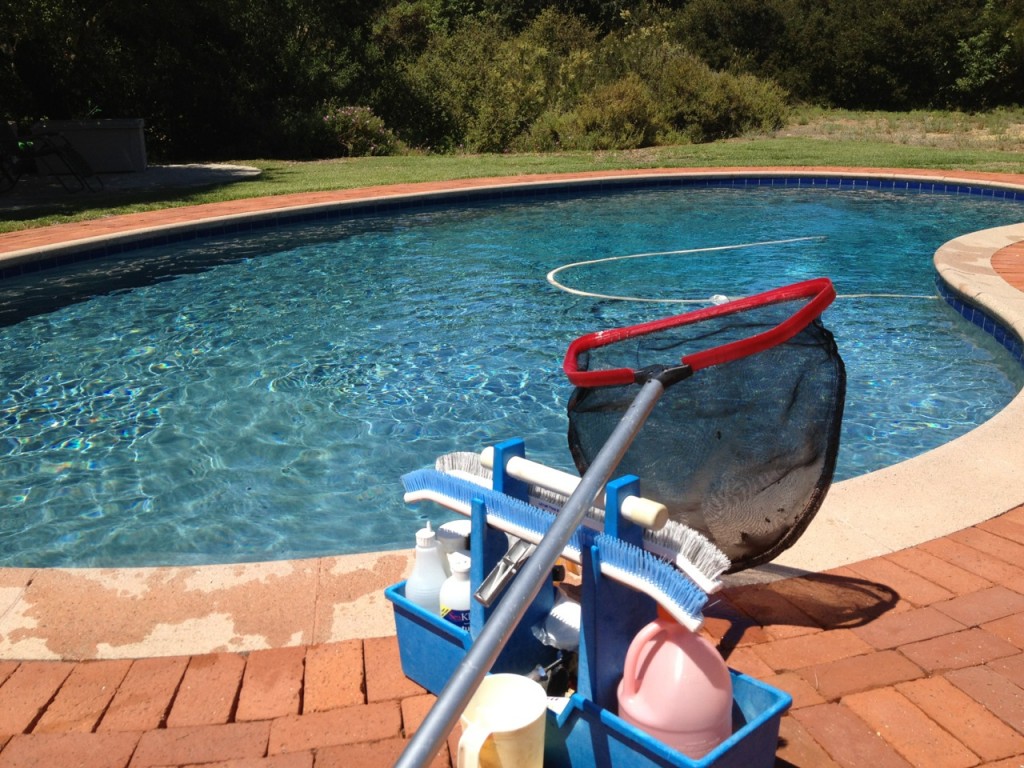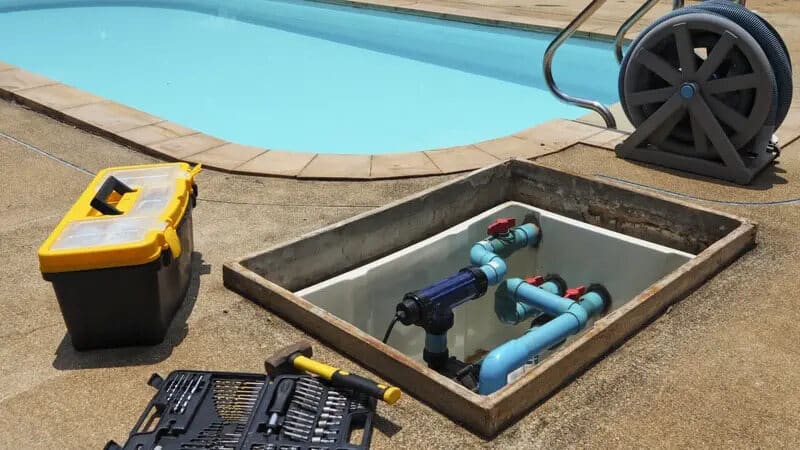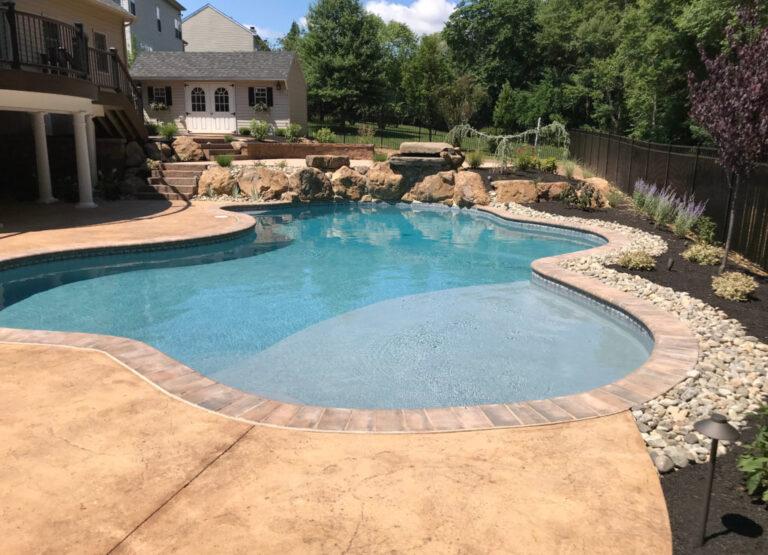A backyard swimming pool is the centerpiece of summer joy. It’s where family memories are made, where you escape the humid Pennsylvania heat, and where your landscaping vision truly comes to life. But when things go wrong, that dream can quickly turn into a frustrating and expensive headache. Unexpected pool repairs are one of the biggest concerns for any owner.
The good news? You have more control than you think. By understanding the most common issues and embracing proactive care, you can prevent most major problems before they start. This guide will walk you through the top five pool repairs we see here in Pennsylvania, how to avoid them, and when it’s time to call for professional pool service and repair. Let’s dive in and protect your investment.

The Usual Suspects: Top 5 Pool Repairs in Pennsylvania
Our climate, with its freezing winters and warm summers, creates a unique set of challenges for pool owners. Here are the issues that keep popping up.
1. Leaky Pipes and Plumbing Nightmares
The constant freeze-thaw cycle in Pennsylvania puts immense stress on underground plumbing. When water in the lines freezes and expands, it can easily crack PVC pipes, leading to costly and hard-to-find leaks.
- Signs of Trouble: A sudden drop in water level (more than an inch in a day), soggy spots in the yard around the pool, or visible cracks in the equipment pad.
- How to Avoid It: The single most important preventative step is professional winterization. Properly blowing out the lines ensures no water is left to freeze and cause damage. During the season, maintain balanced water chemistry, as corrosive water can degrade plumbing components over time.
2. Filter Failures and Murky Water
Your filter is the kidneys of your pool, constantly working to remove dirt and debris. When it fails, your water quality plummets. Common issues include clogged or torn filter cartridges, damaged multiport valves, and internal component breaks.
- Signs of Trouble: Consistently cloudy water despite proper chemical levels, high readings on the filter’s pressure gauge, or debris blowing back into the pool from the return jets.
- How to Avoid It: Clean your filter regularly based on the manufacturer’s instructions. For cartridge filters, this means a thorough hosing down every few weeks. For sand or D.E. filters, backwashing is key. Don’t delay cleaning—an overworked filter is an ineffective one.
3. Pump Problems and Loss of Flow
The pump is the heart of your pool’s circulation system. Without it, water stagnates, chemicals don’t disperse, and your filter can’t do its job. Motors burn out, seals fail, and pumps can lose their prime (the ability to pull water).
- Signs of Trouble: The motor makes a loud humming or grinding noise, the pump won’t turn on, or there’s no water moving in the pump basket.
- How to Avoid It: Keep the skimmer and pump baskets clean. A clogged basket restricts water flow, forcing the motor to work harder and overheat. Ensure the area around the pump has good ventilation and isn’t prone to flooding. A simple, proactive check can prevent a complete motor burnout.
4. Liner Tears and Surface Cracks
For the many vinyl liner pools in our area, a tear is a significant problem that can lead to water loss and damage to the pool’s structure underneath. Concrete and gunite pools can develop surface cracks for similar reasons, often related to ground shifting during winter freezes.
- Signs of Trouble: Visible rips or holes in the vinyl, a liner pulling away from the wall, or spiderweb cracks appearing on a gunite surface.
- How to Avoid It: Be mindful of what goes into your pool. Avoid sharp objects, toys, or even pet claws, which can easily puncture a vinyl liner. For all pool types, maintaining proper water chemistry is crucial. According to the Pool & Hot Tub Alliance (PHTA), balanced pH and alkalinity levels prevent the liner from becoming brittle and protect plaster surfaces from deteriorating.
5. Heater Malfunctions
A pool heater is essential for extending the relatively short swimming season in Pennsylvania. But these complex units are prone to issues, from ignition failures to inefficient heating.
- Signs of Trouble: The heater won’t turn on, it cycles on and off frequently, or the water simply isn’t getting warm.
- How to Avoid It: Annual professional maintenance is your best bet. A technician can clean the internal components, check electrical connections, and ensure proper function before you need it most. Also, keep rodents and insects from building nests inside the unit during the off-season by using a solid heater cover.
Your Proactive Pool Care Playbook
Avoiding pool repairs is all about shifting from a reactive mindset to a proactive one. A little consistent effort saves a lot of future pain.
The Weekly Check-Up: More Than Just Skimming
Your pool needs a quick health check at least once a week.
- Test and Balance Water: Use a quality test kit. Unbalanced water is the silent killer of pool equipment and surfaces.
- Empty Baskets: Clear out the skimmer and pump baskets to ensure strong water flow.
- Skim and Brush: Remove surface debris before it sinks and stains. Give the walls a quick brush to prevent algae from getting a foothold.
Prepping for a Pennsylvania Winter
Properly closing your pool is not just about putting a cover on it. It’s the most critical service you can perform to prevent winter damage. This involves:
- Balancing the Water Chemistry: Adding winterizing chemicals to protect surfaces.
- Lowering the Water Level: To prevent freezing in the skimmer.
- Blowing Out and Plugging All Lines: This is the most crucial step to prevent freeze-related pipe bursts.
- Winterizing Equipment: Draining the pump, filter, and heater.
- Installing a Secure Winter Cover: To keep debris out and, for safety covers, to protect people and pets.
Because this process is so vital, many Pennsylvania homeowners trust it to a professional pool service and repair company to ensure it’s done right.
DIY vs. Professional Pool Service: Making the Right Call
Many homeowners can handle basic weekly maintenance, but when does it make sense to call for backup?
| Task | DIY Approach | Professional Service |
| Weekly Cleaning | Pros: Cost-effective. | Pros: Saves you time; expert eyes can spot issues early. |
| Chemical Balancing | Pros: Good skill to learn. Cons: Can be confusing; mistakes can be costly. | Pros: Guarantees correct levels; uses high-grade chemicals. |
| Pool Opening/Closing | Cons: High risk of error, especially winterizing plumbing lines. | Pros: Ensures protection against freeze damage; saves a full day of work. |
| Leak Detection | Cons: Very difficult to pinpoint underground leaks without special equipment. | Pros: Uses advanced tools (pressure tests, acoustic sensors) for accuracy. |
| Equipment Repair | Cons: Can be dangerous (electricity/gas); may void warranties. | Pros: Safe, efficient, and ensures the correct parts are used. |
Frequently Asked Questions (FAQs)
Q: How much do common pool repairs cost in Pennsylvania?
A: Costs vary widely. A simple liner patch might be under $100, while a pump motor replacement could run from $700 to $1,300. A major underground leak repair can easily exceed $2,000. This is why preventative maintenance is so crucial—it’s an investment in avoiding these larger bills.
Q: Can I do all my own pool service and repair?
A: You can certainly handle day-to-day tasks like skimming and testing water. However, for complex jobs involving plumbing, electrical components, or gas heaters, it is always safer and more effective to focus on choosing the right pool professional. Improper repairs can lead to bigger problems or safety hazards.
Q: How often should my pool be professionally serviced?
A: At a minimum, we recommend professional service for opening and closing your pool each year. For homeowners who want a completely hands-off experience, a weekly or bi-weekly service plan during the swim season ensures your pool is always pristine and potential issues are caught immediately.

Your Partner in a Perfect Pool Season
Your swimming pool should be a source of relaxation, not a list of chores and worries. By understanding the common pitfalls of pool ownership in Pennsylvania and committing to a routine of proactive care, you can enjoy a crystal-clear, trouble-free pool year after year. From weekly upkeep to the crucial task of winterization, consistent attention is the key to avoiding most major pool repairs.
When a problem does arise, or if you simply want the peace of mind that comes with expert care, don’t hesitate to reach out.
Ready to make this your most relaxing pool season yet? Contact FS Landscaping Contractors today to discuss our comprehensive pool service and repair options that keep your backyard oasis in perfect condition.

